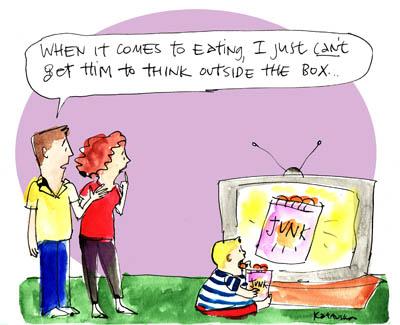Marketing is the key in establishing a good brand reputation and boosting sales. However, marketing sometimes can cause some ethics issues.
As far as we concerned, childhood obesity is highly related to the high number of food advertising targeted at children. As children’s economic influence increases, food marketers see children as a lucrative market to be tapped and tend to advertise more at children. With minimal government regulation, children are being bombarded by food advertisements through television like never before. Statistics shows that children in US viewed an average of 6,000 food advertisements on television a year during the 1970s, but this number rising to 9,000 a year during the 1980s, and finally to more than 12,000 a year during the 1990s. This indicates that there are more and more children being brainwashed by the food commercials.
Result of analysis shows that exposure to advertisements that promote energy-dense nutrient-poor foods can stimulate excessive energy intake and exaggerating unhealthy choices among foods such as junk food and fast food. Besides, from a psychological perspective, children are more defenceless to the influencing nature of advertising than the adults. Based on Piaget’s work on children’s cognitive development, children under the age of eight are especially vulnerable simply because they lack the cognitive skills to comprehend commercial messages compared to teenagers and adults.
We all know that McDonald’s is bad for your waistline and for your health, but what the McDonald’s commercial tells us is contrast with the facts. McDonald’s commercial always portrays that McDonald’s restaurant is a fun place for kids where they can enjoy both playing and eating. The commercials tell us that McDonald’s restaurant is the perfect place for family to eat out because of its affordable price, food quality and uncompromising hygiene. Sometimes, they also release Happy Meal toys to attract kids. They have never mentioned that their food is excessive in salt and fat which contribute to obesity.
Provided that most countries are implementing self-regulating system in advertising industry, food companies have their own power in disseminating their consumerist ideology to children through advertisements on television. It is clear that advertising to children is unethical, but should it be set as illegal as well? Sauder School of Business professor, Tirtha Dhar suggests that an advertising ban can be an effective approach to battle childhood obesity. What do you think?

wow
parents are the main role to choose foods that are actually healthy and preferred by the
and parents should actively provide knowledge under her eating is unhealthy
thank you for the information you have made very good
I appreciate it sangant
greetings success always for you, amen